By: Izumi Hasegawa November 27, 2023
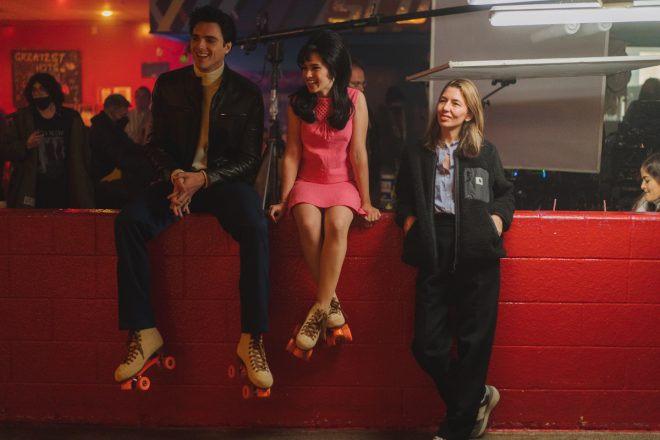
Sofia Coppola’s eighth directorial feature film focuses on Priscilla Presley, the wife of rock and roll legend Elvis Presley. Why did she decide to tell Priscilla’s story? Were there any stories not included in Priscilla’s memoir that ended up in the film? Sofia also gushed about working with the talented Cailee Spaeny and Jacob Elordi!
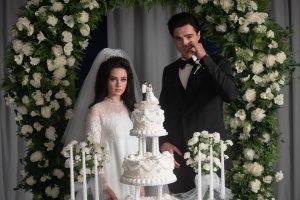
Photo by Philippe Le Sourd / A24
Q: What made Priscilla the perfect movie for your eighth directorial film?
I was reading this book, Priscilla Presley’s memoir and I never expected it to be so, I get so involved and I was really surprised because I realized how little I knew about her. And I just was really moved by her story and really connected to the way she described just everything she went through to go from being a girl to an independent woman after such an unusual circumstance. I had no idea she was in high school living at Graceland and I felt like her story said so much about women of my mother’s generation and what all girls go through, but in this really unique way. So I felt, and I also decided to dive into that world of ’60s Graceland American folklore.
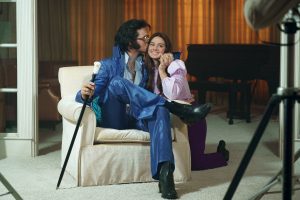
Photo by Sabrina Lantos / A24
Q: What additional influence and collaboration you have with Priscilla to bring the film to life?
Yeah, being able to speak with her a lot when I was starting the project and then as I was working on the script I would keep questions and then periodically be able to ask her about certain to add in to fill in more blanks of the
story and then we went through the script together and just giving little details that she gave me really helped bring it to life for me and made them human and especially the story. The scene where they’re in the movie theater and Elvis is lip syncing along with Humphrey Bogart and talking about Marlon Brando. I don’t think that’s in
the book and it was a story she told me which I thought was really important to include because it said so much about his frustrations as an artist, and that he wanted to be a serious actor and then later when you see where some of his frustration is coming from. So things like that and just her experience about how she wasn’t able to really be close to any of the women that were the wives of the Memphis Mafia and it’s sort of the isolation that she and the pressure she had to be this ideal.
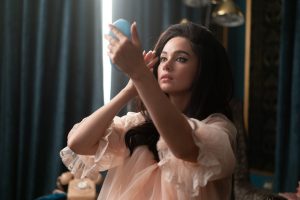
Photo by Sabrina Lantos / A24
Q: The film reminds me of Lost in Translation (2003). The loneliness behind the fame. It seems the emotion speaks to you. Could you talk about that reason and what your experience, how your experience related to that situation in both films?
Yeah, I didn’t link them, but that makes sense. But I’m always interested in the kind of the fantasy and the reality of what looks like one thing, looks ideal and then the reality of that and maybe growing up around the film business. I’ve kind of seen the different side. So I don’t have a more realistic view of what that can be like.
And for the straight, it just looked like such a fairytale on the outside. And then to hear the struggles that she went through and it’s not at all what you expect that she had this ideal life. And there were the highs and the lows, but she struggled too. I think there’s this idea in our culture that like the fame and wealth will make you happy and that just the reality of that it comes with a whole other set of baggage. So I’m always interested in, I guess, the mix of fantasy and reality.
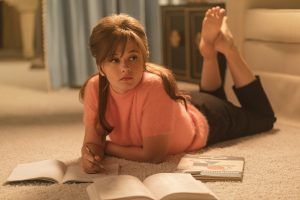
Photo by Sabrina Lantos / A24
Q: You shot 30 days. That must have been like exhilarating to like move at that kind of pace and, not dragging it out like it would be like a big budget kind of thing. Cailee had to play someone from 14 to 28. Most movies are shot out of order. How did the conversations and the collaboration with Cailee like?
Yeah, it was really all over because we were jumping around in time and I was really impressed. When Cailee would show up on set, I would know where we were in the story because of the way she looked and then somehow she kept track of it because when we cut it in order, I was like, oh my God, she really makes this very gradual transformation but yeah, I was impressed how she kept track and we were just kind of focused on each scene but we were all set since we had our teenage bedroom next to Graceland living room and jumping back and forth and yeah, I was like, yeah, scramble. So luckily, we just were able to immerse ourselves in the scene and find our way through and somehow it cuts together and she really transformed from what age she was. So how we got it all up and she’s a hard worker. She never complained. It’s like hours and hours of hair and all that but I hope we got all the pieces we needed so it was, you know, a thrill to cut it together and find that the scenes work together.
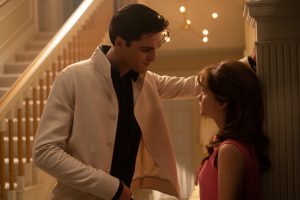
Photo by Sabrina Lantos / A24
Q: Jacob is magnificent in this film. Such a completely different take of Elvis. How did you work with Jacob to sort of walk that fine line with capturing the charm of it all, but being like this guy’s got some quirks if you will?
Yeah, for me it was really important to go by the perspective that Priscilla writes about in her book about, you know, showing him as a human which I think he’s such a godlike figure in our culture and history and to show his human side and she talks about what he was like his vulnerabilities and what they were like behind closed doors.
And, I thought it was so interesting to ride the highs and lows that she went through and show his incredible charm and low ability and also this dark side that he had and show it as the complex relationship that it was. But I want, it was important that he was never villainized that, you know, that we saw him as a human with, that he was struggling and understand her story through that.
Priscilla is now playing in theaters.
Edited by Tiffany Le / Hollywood News Wire Inc.
